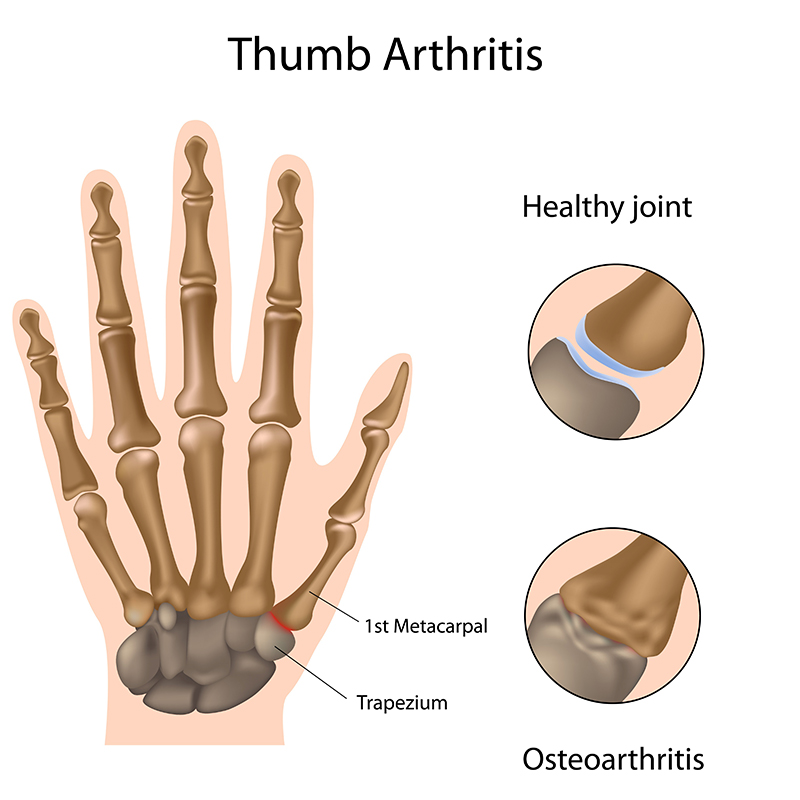Thumb Arthritis
Thumb arthritis is arthritis that affects the joint at the base of the thumb (the basal joint). Thumb arthritis or osteoarthritis of the thumb causes wear and tear of the joint cartilage and underlying bone over time. As the cartilage wears away, bone rubs against bone leading to joint damage and more pain.

What causes thumb arthritis?
Thumb arthritis or basal joint arthritis is caused by a combination of many factors such as age, weight (obesity), hobbies or jobs that stress the thumb joint, computer work for extended periods of time, diseases affecting the cartilage, such as rheumatoid arthritis, and previous injuries.
One of the major causes of thumb arthritis is repetitive use of the carpometacarpal joint between the thumb and the wrist. Over time this use causes wear and tear of cartilage (osteoarthritis) that the body cannot repair quickly enough.
What are the symptoms of thumb arthritis?
Some of the common symptoms of thumb or basal joint arthritis include thumb pain, loss of strength in the thumb, limited range of motion in the joint, swelling at the base of the thumb, and/or grinding of the thumb.
Since the carpometacarpal joint controls grasping, weakness of the hands and inability to grasp objects is a common symptom of thumb arthritis.
Who is at most risk of getting thumb arthritis?
Thumb arthritis is more common in women and usually occurs after age 40.
How is thumb arthritis diagnosed?
During your consultation, your hand doctor will ask you about your symptoms, pain patterns, activities that aggravate the condition, and if you have had any prior injuries to your thumb.
Your doctor will also examine your hand, holding the joint firmly while moving the thumb to see if pain or a gritty feeling is present, or if a grinding sound can be heard (crepitus). This exam is done to see if the bones are rubbing directly against each other.
Additionally, x-rays are ordered to check for deterioration of the joint as well as any bone spurs or calcium deposits that may have developed.
Since many people with thumb arthritis also have symptoms of carpal tunnel syndrome, your doctor may check for that as well.
What is the treatment for thumb arthritis?
There are both nonsurgical and surgical treatment options available for thumb arthritis.
Nonsurgical Treatment
In its early stages, thumb arthritis can be treated effectively with nonsurgical treatment that may include:
- Taking anti-inflammatory medications, such as aspirin or ibuprofen, to help reduce inflammation and swelling.
- Icing the joint for 5 to 15 minutes several times a day.
- Wearing a supportive splint during the day or overnight to limit the movement of your thumb and allow the joint to rest and heal.
Because thumb arthritis is a progressive, degenerative disease, the condition may worsen over time, requiring cortisone injections directly into the joint.
These injections can provide relief for several months; however, they should not be repeated indefinitely.
Surgical Treatment
If nonsurgical treatment options do not alleviate the symptoms of thumb arthritis, then surgery is an option. Surgery can be performed on an outpatient basis, and several different procedures can be used, including minimally invasive procedures. Your hand surgeon will discuss your options for surgery with you and help select the best one for you.
How long does it take to recover from thumb arthritis surgery?
The length of your recovery period depends on the type of surgery you have. Generally, though, you can expect to wear a cast for 4 to 8 weeks after thumb arthritis surgery. Your doctor may also recommend a rehabilitation program that involves physical therapy (hand therapy) to help you regain movement and strength in the hand. Again, depending on the type of surgery you have, it may take you several months to return to normal activities.
What happens if you don’t get treatment for thumb arthritis?
If you don’t get treatment for thumb arthritis, symptoms can get worse over time, affecting your ability to grip things in your hand.
Thumb Arthritis Treatment in Fremont, California
If you are experiencing any symptoms of thumb arthritis, contact us to schedule an appointment with Dr. Besh. Dr. Besh is an expert in upper extremity and hand conditions. He is fellowship-trained and has a subspecialty certificate in surgery of the hand. Your hands should be cared for by an expert with over 15 years of focused experience in orthopedic hand conditions.
